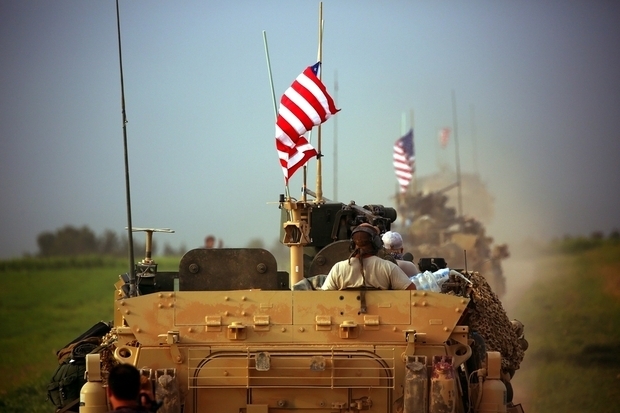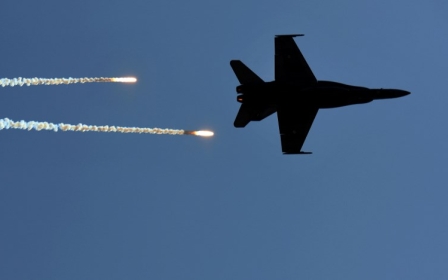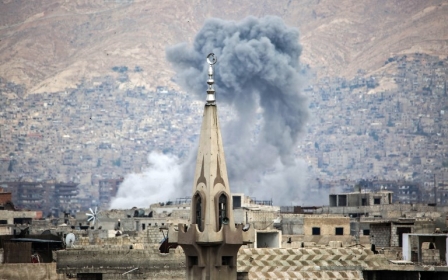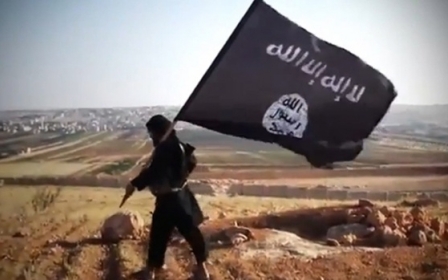ANALYSIS: Trump's moves in Syria are tactical, not strategic

NEW YORK, United States – The shooting down of an Iranian-made drone by a United States warplane in southeast Syria on Tuesday was the latest sign of Washington’s greater willingness to confront Damascus and its allies since Donald Trump became president.
It came on the heels of US forces knocking a Syrian army jet out of the sky near Raqqa on Sunday. Iran-backed militias have repeatedly come under US fire recently and, in April, Trump ordered cruise missile strikes on a Syrian airfield, ostensibly responding to a poison gas attack.
Analysts contacted by Middle East Eye praised Trump’s greater readiness to use force in Syria than his predecessor, Barack Obama. Others warned that without a broader endgame strategy, US muscle-flexing risked a deeper confrontation with Syria or its backers, Iran and Russia.
“Trump’s very muscular on foreign policy. He doesn’t look at the ramifications, repercussions or the bigger picture. He’s tactical, as opposed to strategic, and I think he’s going to escalate against the Russians,” Barak Barfi, from the New America Foundation, a think-tank, told MEE.
Moscow reacted angrily to the US downing Syria’s jet, saying it would treat US-led coalition aircraft flying west of the Euphrates River in Syria as potential targets and will track them with weapons systems, but stopped short of threatening to fire on them.
After a US F-15 jet destroyed an armed Iranian drone near al-Tanf base along Syria’s eastern border on Tuesday, Russia’s deputy foreign minister, Sergei Ryabkov, railed against the US-led coalition for “complicity with terrorism”.
Will Trump raise tensions with Iran or Russia?
For Jennifer Cafarella, from the Institute for the Study of War, a think-tank, the Pentagon’s approach is sound – use force to deter aggression from forces loyal to Syrian President Bashar al-Assad and his backers and focus on the stated goal of defeating the Islamic State (IS) group.
“I don’t think the US risks a shooting war with Iran or Russia because it has taken no offensive action and has consistently messaged that it has no offensive intent,” Cafarella told MEE, adding that aggression from Damascus-aligned forces was the real danger.
“The question is whether the pro-Assad coalition intends to contain and deter the US, or if it intends to pick an actual fight. I currently assess the former, but we must be alive to the less likely but dangerous possibility of the latter.”
Trump, a Republican, has delegated more authority to his generals to make battlefield decisions. By launching 59 Tomahawk missiles on a Syrian government airfield in April, he was lauded for enforcing a “red line” against chemical weapons use that Obama, a Democrat, failed to apply in 2013.
'The question is whether the pro-Assad coalition intends to contain and deter the US, or if it intends to pick an actual fight'
- Jennifer Cafarella, Institute for the Study of War
Like his predecessor, Trump has focused on defeating IS. But as the religious extremists’ self-proclaimed caliphate dwindles, the Assad-aligned forces are increasingly competing for newly liberated territory with their US-backed rivals.
They include the US-backed Kurdish-Arab Syrian Democratic Forces (SDF), which controls four neighbourhoods of Raqqa and are close to encircling the de facto IS capital. Assad-allied forces, meanwhile, are focused further east on the mostly IS-held oil-rich province of Deir Ezzor.
Government forces skirted around al-Tanf base on 9 June and reached the Iraqi border for the first time since 2015. That effectively blocked US-led coalition forces in their garrison, and secured a land corridor connecting Iranian-backed militias in Syria and Iraq.
“US generals do not want this to happen and will use force to prevent it, as they have done,” Bob Freedman, a Johns Hopkins University scholar, told MEE.
“The Assad regime, in my view, would like to precipitate a conflict between Russian and US forces, and would like to exploit Russian military forces to regain all of Syria - that is, fight to the last Russian.
“I don’t think [Russian President Vladimir] Putin wants this and will not take the chance to shoot down a US plane with its SAM-400s.”
No clear strategy
As Assad strives to win his country back, with help from Russia and Iran, Trump and his national security aides have not advanced a clear strategy of what Syria will look like, or who will run it, after the six-year-old bloodbath grinds to a halt.
All the while, Washington is riven over whether its chief goal is routing IS or halting Iran’s growing influence in Syria and across the Middle East,” Jonathan Cristol, a scholar at the World Policy Institute, a think-tank, told MEE.
“It has no coherent strategy in Syria, but the administration’s instincts are to oppose IS and Iran at every turn. The problem is that Iran and IS oppose each other in Syria. Navigating that requires nuance and sophistication that this administration lacks,” Cristol said.
“I don’t think Trump’s team has any desire to escalate any conflict with Russia - quite the contrary - and I think that direct confrontation with Iran is something it would stumble into rather than plan on.”
For Francis Boyle, a University of Illinois law scholar, the military escalation under Trump raises a constitutional problem. US attacks on IS and al-Qaeda have been justified under the open-ended Authorisation for Use of Military Force passed by Congress after the 9/11 attacks in 2001, but attacks on Assad’s government forces and allies “have no justification whatsoever”, Boyle said.
“It is obviously impeachable. But pro-war Democrats don’t raise it because it would constrain the US president’s war-making capacities,” Boyle told MEE.
“Israeli strategic interests are obviously served by a breakup of Syria, as is the case for much of the US establishment. The Saudis are clearly on board. The Russians, rhetoric aside, are likely simply looking for some scraps.
“The big losers are the Syrians and most of the other people of the region,” Boyle said.
New MEE newsletter: Jerusalem Dispatch
Sign up to get the latest insights and analysis on Israel-Palestine, alongside Turkey Unpacked and other MEE newsletters
Middle East Eye delivers independent and unrivalled coverage and analysis of the Middle East, North Africa and beyond. To learn more about republishing this content and the associated fees, please fill out this form. More about MEE can be found here.




